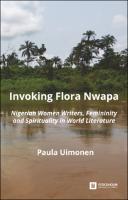Invoking Flora Nwapa
Nigerian women writers, femininity and spirituality in world literature
| dc.contributor.author | Uimonen, Paula | |
| dc.date.accessioned | 2020-12-18T17:03:47Z | |
| dc.date.available | 2020-12-18T17:03:47Z | |
| dc.date.issued | 2020 | |
| dc.identifier | ONIX_20201218_9789176351208_15 | |
| dc.identifier.issn | 2002-6293 | |
| dc.identifier.uri | https://library.oapen.org/handle/20.500.12657/45702 | |
| dc.description.abstract | By invoking Flora Nwapa, this monograph draws attention to Nigerian women writers in world literature, with an emphasis on femininity and spirituality. Flora Nwapa’s Efuru (1966) was the first internationally published novel in English by a female African writer. With the establishment of Tana Press in 1977, Flora Nwapa also became the first female publisher in Africa. Although Flora Nwapa has been recognized as the ‘mother of modern African literature’, she is not sufficiently acknowledged in world literary canons or world literature studies, which is something this monograph aspires to redress, with the help of earlier studies, especially Nigerian scholarship. Drawing on the Efuru@50 celebration in Nigeria in 2016, this book explores the revival of Flora Nwapa’s fame as the pioneer of African women’s literature. Using an ethnographic rather than biographical approach, it captures Flora Nwapa’s literary practice in the context of the Nigerian literary scene and its interlinkages with world literature. The ethnographic portrayal of Flora Nwapa is complemented with an exposé of a select number of contemporary Nigerian women writers, based on interviews during fieldwork in Nigeria. The book uses concepts like creolized aesthetics and womanist worldmaking to advance scholarly understandings of world literature, which is conceived here as a pluriverse of aesthetic worlds. Exploring experimental ethnographic writing, the book combines the genres of creative non-fiction, descriptive ethnography and scholarly analysis, in an effort to make the text more accessible to academic as well as non-academic readers. Through travel notes the experience of fieldwork is shared in a candid manner. Detailed ethnography from the Efuru@50 literary festival is presented to show the expansion of Flora Nwapa’s fame. In-depth analyses of Flora Nwapa’s literary works and the cultural context of her literary practice cover a wide range of themes, from feminine storytelling and children’s literature, to publishing and digitalization. The theoretical discussion draws on anthropological, literary and African womanist theory to contextualize and explore the central themes of femininity and spirituality in world literature. Inspired by the social change perspective of African womanism and critical decolonial theory, the book makes a contribution to current efforts to explore a more socially just and environmentally sustainable world of many worlds. Paying close attention to gender complementarity and sacred engagements in Flora Nwapa’s literary worldmaking, it shows how world literature can help us create other possible worlds of human, spiritual and environmental coexistence. | |
| dc.language | English | |
| dc.relation.ispartofseries | Anthropology & Society | |
| dc.subject.classification | thema EDItEUR::J Society and Social Sciences | en_US |
| dc.subject.classification | thema EDItEUR::J Society and Social Sciences::JH Sociology and anthropology::JHM Anthropology | en_US |
| dc.subject.classification | thema EDItEUR::D Biography, Literature and Literary studies | en_US |
| dc.subject.classification | thema EDItEUR::D Biography, Literature and Literary studies::DS Literature: history and criticism::DSA Literary theory | en_US |
| dc.subject.classification | thema EDItEUR::D Biography, Literature and Literary studies::D Biography, Literature and Literary studies::DS Literature: history and criticism | en_US |
| dc.subject.classification | thema EDItEUR::Q Philosophy and Religion::QR Religion and beliefs::QRY Alternative belief systems | en_US |
| dc.subject.other | African women writers | |
| dc.subject.other | Literary worldmaking | |
| dc.subject.other | Creolized aesthetics | |
| dc.subject.other | African womanism | |
| dc.subject.other | Water goddess | |
| dc.subject.other | Pluriverse | |
| dc.title | Invoking Flora Nwapa | |
| dc.title.alternative | Nigerian women writers, femininity and spirituality in world literature | |
| dc.type | book | |
| oapen.identifier.doi | 10.16993/bbe | |
| oapen.relation.isPublishedBy | 8137467e-e537-45b2-b1c8-94fc2574b729 | |
| oapen.relation.isFundedBy | 6a84cd26-2bed-4007-bce3-ef92fd998bfb | |
| oapen.series.number | 2 | |
| oapen.pages | 256 | |
| oapen.place.publication | Stockholm, Sweden | |
| oapen.grant.number | M15-0343:1 |

